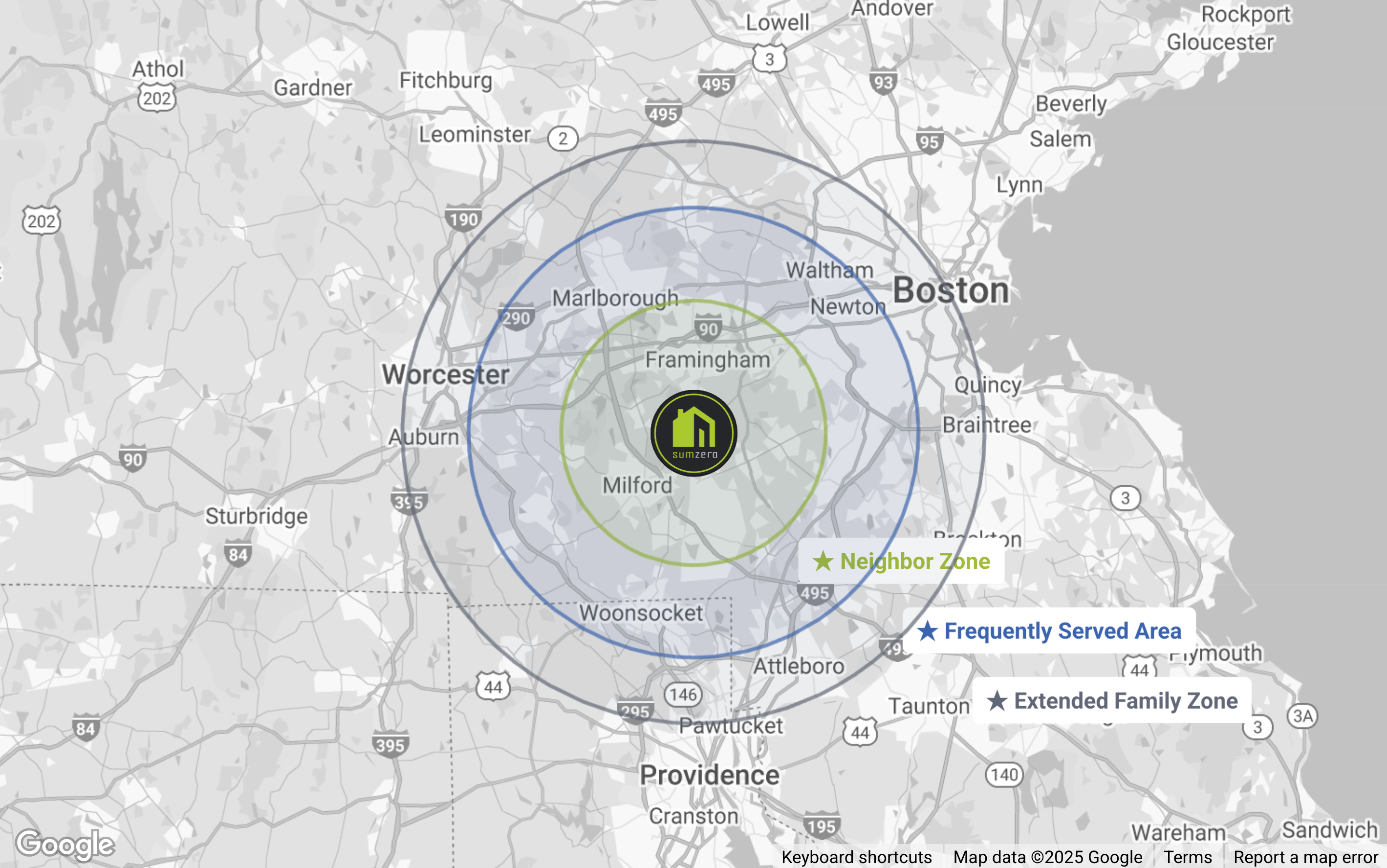Energy Recovery Ventilators | Hanover, MA
Energy recovery ventilators in Hanover MA are advanced home ventilation systems that exchange stale indoor air with fresh outdoor air while preserving energy efficiency. Ideal for year-round comfort, these whole-house air exchangers improve indoor air quality and reduce heating and cooling costs for homeowners in Hanover.


Elevate Indoor Comfort with Energy Recovery Ventilators in Hanover, MA
Living in Hanover, MA means enjoying the charm of New England's seasons—from crisp fall air to snowy winters and humid summers. However, these seasonal shifts also place unique demands on your home’s indoor air quality and energy performance. Many homes in Hanover, especially older constructions or well-insulated newer builds, face a common problem: stale indoor air and higher utility costs due to insufficient ventilation.
This is where energy recovery ventilators (ERVs) come in. Designed for climate zones like ours, ERVs offer a smart, balanced solution for fresh air exchange without forfeiting energy efficiency. Whether you're in one of Hanover's colonial-style homes or a modern ranch, integrating a high-performance ERV can significantly improve your indoor environment while reducing your utility bills.
Why Energy Recovery Ventilators Are Essential in Hanover, MA
Understanding How ERVs Work
Energy Recovery Ventilators (ERVs) are advanced home ventilation systems that exchange stale indoor air with fresh outdoor air while recovering heat and humidity from the outgoing air. This process is particularly beneficial during our cold winters and muggy summers in Hanover, when opening windows can either freeze your pipes or overwhelm your AC.
With ERVs, your home stays fresh, comfortable, and energy smart—year-round.
“With our Massachusetts winters sometimes plunging below 20°F and summers reaching above 85°F, it’s no wonder more Hanover residents are turning to ERVs for cost-effective fresh air circulation.”
Key Systems Components and Integration
An ERV system consists of ductwork, filters, and a heat exchanger core. Many modern HVAC setups in Hanover can easily incorporate these systems either as upgrades to existing ductwork or as standalone setups.
- Compatible with both central and mini-split systems
- Integrated filtration helps manage air quality control
- Ideal for retrofits in historic South Shore homes and newer builds in The Elms or Jedediah’s Landing
ERVs & the Hanover Climate
Hanover homes often experience high humidity levels in the summer and dry air in the winter. ERVs regulate moisture better than alternative systems, maintaining optimal indoor comfort with minimal energy waste. Plus, given our town’s pinch with ever-climbing utility costs, ERVs contribute to improved home energy efficiency.
Benefits of Installing ERV Systems in Hanover Homes
Enhance Indoor Air Quality Year-Round
One of the top concerns among Hanover families is maintaining a healthy indoor environment. ERVs cycle out pollutants, allergens, and excess moisture without the need to crack a window on a damp or freezing day.
Benefits include:
- Reduced mold risks in attics and basements
- Fresher-smelling indoor air
- Decreased allergens and particulate matter, improving overall air quality control
Improve Home Energy Efficiency
Compared to traditional ventilation methods, ERV systems recover heat and moisture, reducing the strain on your heating and cooling systems. In fact, many homeowners in Hanover see a 20–30% improvement in home energy efficiency after installation.
How ERVs help cut costs:
- Heat/moisture exchange reduces HVAC load
- Lower utility bills, especially during peak seasons
- More consistent indoor temperature and humidity
“Installing an ERV in our South Shore cape-style home cut our winter heating costs by 25%. It’s the most practical upgrade we’ve made in years.”
Suitable for Hanover Home Layouts
Hanover has a mix of architectural styles—from vintage farmhouses to high-efficiency new builds. Fortunately, ERV systems are adaptable:
- Retrofits for older homes with limited ductwork
- Integrations for new construction compliant with MA Stretch Energy Code
- Flexible unit sizes fit townhouses to multi-level single family homes
Comparing ERV vs HRV for Hanover Residents
What’s the Difference Between ERV and HRV Systems?
Both ERVs and HRVs are engineered to ventilate residential spaces. But while Heat Recovery Ventilators (HRVs) only exchange heat, ERVs transfer both heat and moisture, which is critical in moisture-variable climates like ours.
ERV Highlights:
- Recovers both heat & humidity
- Ideal for cold winters and humid summers
- Better moisture balance in sealed homes
HRV Highlights:
- Only transfers heat (no humidity exchange)
- Better suited for dry, cold climates
- May increase indoor dryness in winter
With Hanover’s humid summers and heating-intensive winters, ERVs typically offer superior performance.
When to Choose an ERV Over an HRV
Massachusetts building codes increasingly favor balanced ventilation solutions, making ERVs the better option in most residential scenarios.
Choose ERV if:
- Your Hanover home is sealed tightly for energy conservation
- You frequently experience condensation or dampness
- You seek comfort in both winter and summer seasons
Choose HRV if:
- You live in an older home with high natural humidity
- You prefer a slightly drier indoor atmosphere year-round
“Humidity doesn’t just affect comfort—it influences how much energy you burn staying warm or cool. With balanced ERV systems, Hanover homes breathe efficiently and stay more comfortable.”
ERV Efficiency Ratings and Rebates
Thanks to the Mass Save program, eligible Hanover homeowners may qualify for rebates when upgrading to high-efficiency home ventilation systems like ERVs. Units with a certified SRE (Sensible Recovery Efficiency) of 70% or higher are often incentivized.
Check Mass Save’s Residential Rebates for current energy-efficient ventilation offers.
Whole-House Air Exchanger Solutions in Hanover
What Is a Whole-House Air Exchanger?
Unlike portable air purifiers or window ventilation, a whole-house air exchanger integrates directly into your HVAC system, moving fresh air throughout every room in your home.
Features include:
- Centralized control for continuous operation
- Improved air quality control even in tightly sealed homes
- Whole-home distribution including attic, basement, and rooms without windows
Better Than Just Opening a Window
Opening windows in Hanover may invite fresh air, but also brings in pollen, street pollutants, and fluctuating moisture. Whole-house air exchangers let you refresh your air safely—without compromising on energy usage.
Benefits over natural ventilation:
- Filtration of incoming pollutants
- Retains heated or cooled air
- Year-round consistent air change regardless of outdoor conditions
Ideal Pairing for Energy-Efficient Construction
Many of Hanover’s newer homes are built to meet or exceed energy codes, making them well insulated but poorly ventilated. To meet both comfort and code requirements, integrating a whole-house ERV system ensures home energy efficiency doesn’t come at the cost of stale indoor air.
Homes that benefit most:
- Passive or Net-Zero homes on Water Street or Broadway
- New builds under the MA Stretch Energy Code
- Renovated classics with air sealing upgrades
Choosing the Right Home Ventilation System for Hanover Homes
Factors Hanover Homeowners Should Consider
When selecting an ERV for your home, take into account the following:
- Square footage and layout
- Existing HVAC system compatibility
- Budget for installation and maintenance
- Desired control over humidity levels
For example, larger homes in neighborhoods like Forge Pond Park may need higher-capacity ERV units with multiple ducting zones, while smaller ranch homes might only need a compact wall-mounted unit.
Professional Installation Makes the Difference
Proper sizing, duct routing, and commissioning are critical to ERV performance. Hanover homes often have tight mechanical closets or unique attic configurations, making DIY installation risky.
Ensure the following during installation:
- SRE-rated equipment meets Mass Save efficiency standards
- Filters and dampers are easily accessible for maintenance
- Integration supports balanced ventilation across all levels
Maintenance Tips for Long-Term Results
ERVs are low-maintenance but do need occasional attention. Filters and core exchangers should be cleaned or changed 2–3 times per year, especially in pollen-heavy seasons like late spring.
Maintenance tips:
- Clean or replace filters seasonally
- Inspect duct seals and airflow every 6–12 months
- Hire licensed HVAC pros for annual performance checks
Conclusion: Create a Healthier, More Efficient Home in Hanover
Energy recovery ventilators do more than enhance comfort—they create a cleaner, healthier indoor living space, optimized for New England’s ever-changing climate. Whether you’re renovating a coastal colonial or building anew near the Hanover Mall, an ERV system offers lasting value with energy savings and reliable air quality control.
Homeowners who want better control over indoor climate, lower energy bills, and peace of mind should consider ERVs as a long-term, value-added solution tailored for our South Shore environment.
And with growing state rebates and regional emphasis on sustainability, there’s never been a better time to explore energy-efficient home ventilation systems in Hanover, MA.
What Local Homeowners Are Saying
See how SumZero has helped local homeowners stay comfortable year-round with energy-efficient heat pump solutions.
Not Sure Where to Start? We’ll Guide You
Let our experts design the right heating and cooling solution—customized for your comfort, your layout, and your energy goals. No pressure. Just clarity.
Request FREE ESTIMATE









